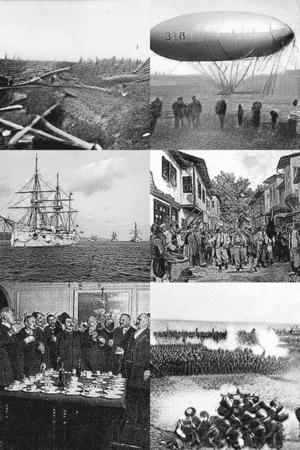First Esermian War
Jump to navigation
Jump to search
This article is incomplete because it is pending further input from participants, or it is a work-in-progress by one author. Please comment on this article's talk page to share your input, comments and questions. Note: To contribute to this article, you may need to seek help from the author(s) of this page. |
| First Esermian War | |||||||||
|---|---|---|---|---|---|---|---|---|---|
 (clockwise from top left)
| |||||||||
| |||||||||
| Belligerents | |||||||||
League powers:
|
Regime powers:
| ||||||||
The First Esermian War, also known as the War of Empires, was a major continental conflict in Esermia that began on 25 February 1888 and ended on 1 January 1893. Involving nearly every major Esermian power of the time, the conflict is regarded as one of the deadliest in recent history and a defining point of modern geopolitics.
Background
Prelude
Summary
Opening stages
- 25 Feb 1888 War begins; Tlusev launches offensives
- 26 Feb 1888 Udnaly occupied by Regime forces. Mobilization of Allied forces begins from major towns in the Colchan Empire and Bavmark.
- 28 Feb 1888 Yuvlona & Karlodorf occupied. Fighting begins at Tetaburg, between local Ameissen militia and Lycorian forces.
- 02 Mar 1888 Allied and Regime regular forces clash along the River Nieder, close to the Kohlian border. Allied forces manage to hold against a now-tired mobilized Regime army.
- 05 Mar 1888 Offensives on Baikav begin from east and north staging grounds. The local garrison requests immediate support from forces along the Nieder.
- 06 Mar 1888 Milita forces surrender at Tetaburg after a week of fighting; falls to Lycorian 1st.
- 10 Mar 1888 Battle of Baikav begins between opposing armies. Further Allied forces from Ferrburg and Reinstein provide support.
- 14 Mar 1888 Regime forces launch a dual offensive on Port Grigor and Lemvig, meeting large resistance against Heran expeditionary forces.
- 17 Mar 1888 The frontline along the Nieder expands as Regime forces launch attacks against Turismach in central-east Colcha. Unsuccessful in attacking across the Nieder, many troops are diverted to assist in capturing the main * city of Baikav.
- 30 Mar 1888 Baikav falls to Regime troops as Allied forces withdraw west to defend the northern border of Bavmark.
- 04 Apr 1888 Struggling to advance on the final Ameissen western coastal towns, Regime forces intensify offensives southwest of Baikav to gain a foothold north of the Baatenian Mountains. They meet resistance against Bavmark alpine troops.
- Apr-May 1888 Fighting along the River Nieder comes to a standstill as the river widens following the winter months. Regime attempts to cross during this time fail.
- May-Jul 1888 Regime forces attempt various offensives from Baikav on the western side of the Nieder, encountering fierce resistance from arriving Colchan and Bavmarkian troops.
- Jul-Aug 1888 Following heavy shelling of Turismach, makeshift amphibious offensives by Regime forces begin in a bid to capture the city.
- 09 Aug 1888 Turismach falls to Regime forces, albeit after suffering heavy casualties.
- Aug-Sep 1888 Allied forces begin a withdrawal of troops west from the Nieder, as Regime advancements continue from the captured centres of Turismach and Baikav.
- Sep-Nov 1888 Regime forces continue to push Colchan troops west through the densely-forested Dierchem region. Allied alpine troops continue to halt the Regime advance in central Bavmark.
- Nov-Dec1888 The forested and rolling terrain slows Regime advancment, allowing Allied forces to set-up defences along the River Friesee, which runs directly through central Colcha and south into Bavmark.
- Jan-Feb 1889 Heavy defences and newly-arrived Allied forces at Mossine in Colcha and Ferrburg in Bavmark slow the Regime advance.
